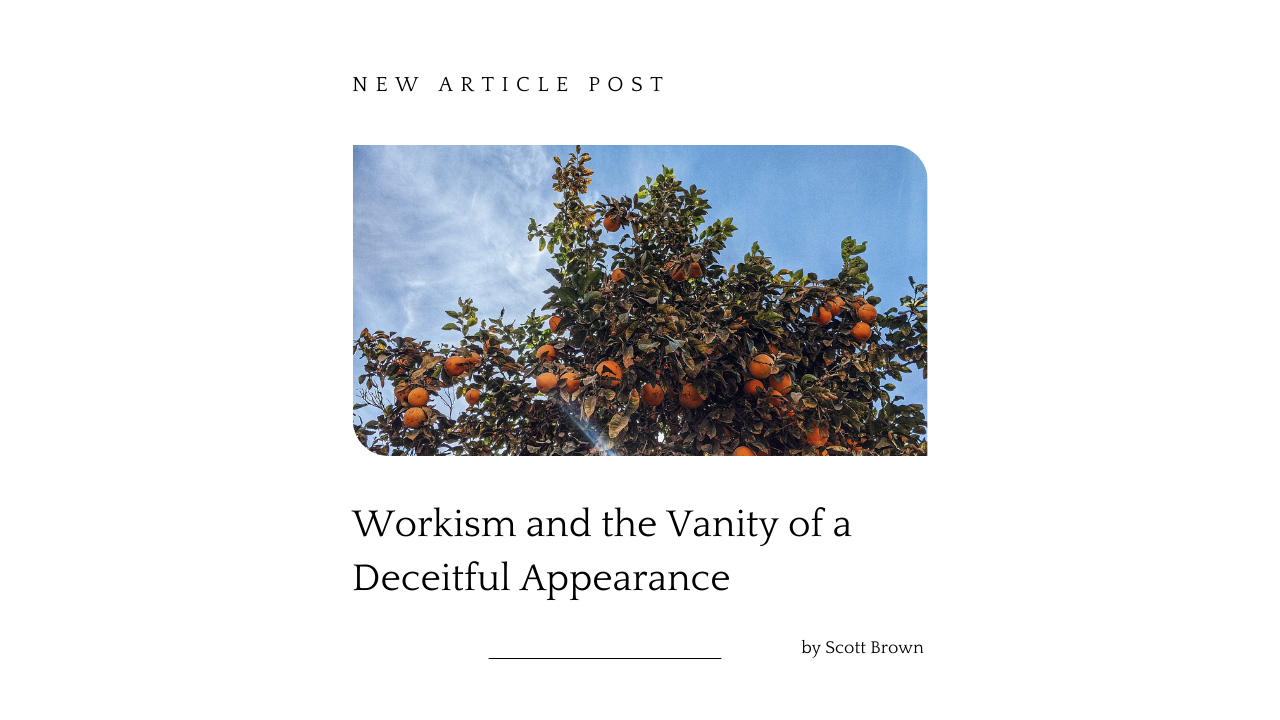Workism and the Vanity of a Deceitful Appearance

I began reading through Isaiah this morning and came across a unique passage in chapter three where the LORD condemns a group of women for being outwardly flashy, seeking to draw attention, and displaying their wealth overtly while inwardly they were corrupt & destitute (Isaiah 3:16-26).
(Don’t worry guys, the men were just as bad).
I wondered how this passage would weave into the workism perspective we see today, and how outwardly we so value looking well to those around us, even when we may be completely sideways on the inside.
Workism and the Deceitfulness of Riches
While “modern” workism is not explicitly named in Scripture, the Bible does present some unique & interesting perspectives on wealth & worldly power – things that tie in well with what is perceivable in workism.
There is a cool concept that Jesus presents with [possibly] my favorite parable of all time: the Parable of the Sower. He says that as the Word is planted, things can happen on the external that will influence the potential of the Word on the internal.
He says, “but all too quickly the message is crowded out by the worries of this life, the lure of wealth, and the desire for other things, so no fruit is produced.” (Mark 4:19, NLT).
No fruit is produced.
That’s tough, especially when we know the Word itself is living, active, and powerful (Hebrews 4:12). Why then would it bear no fruit? Well, it becomes “crowded out”.
Workism presents an ideal that says, “my work identifies me, gives me value, and credits me with respect”. It also tells us that we are valued based exclusively on our productivity & profit, which means that our identity is derived from our performance.
While we operate under the workism philosophy, we are giving way to our carnal intentions of producing salvation – something we have been battling as a species since Genesis 3.
What this philosophy does is “crowd out” the Word in our lives. Workism gives us a different Gospel, one which the Apostle Paul would condemn the teachers of as “accursed” (Galatians 1:8).
This new religion of workism presents a fundamental separation between man & God, one where we are scrambling incessantly to produce, produce, produce, meanwhile our spirit grows faint and our hands grow weary.
Workism as a religion cannot produce salvation. It never ends, there is no hope, and there is no conclusion that results in life. It is an endless cycle that repeats itself forever – until death do you part. What then?
As the Word says, the deceitfulness of these things will not allow the Word to produce fruit in your life. We must take an inventory of our hearts to be assured we are in the right place with Christ, as well as checking our attitudes towards our work to ensure we are standing on faith in God, not faith in work.
The Right Kind of Soil: Workism or Word
Workism is much like the thorns that Jesus mentions in Mark 4; a deceitful lure of the world that chokes out the Word. If that is so, how can we prevent that from happening? What kind of alignment do we need to be in so that we can avoid choking out the fruit of the Word in our lives?
It begins with the right kind of soil.
Workism cannot grow in soil that is saturated in the presence of God, the power of the Word, and the love of the Holy Spirit.
The Word itself is “sharper than any two-edged sword, piercing to the division of soul and of spirit, of joints and of marrow, and discerning the thoughts and intentions of the heart.” (Hebrews 4:12, ESV). That’s simply not a congruent truth for workism philosophy to survive in.
However, we must be working on our end as well, cultivating the soil of our hearts through prayer, study of the Word, and worship.
Workism is simply misaligned worship, so by realigning our worship to God, and away from our work, we can step into the fullness of His purpose and understand our definition from the context of our relationship with Him. That’s the way it should be!
The right kind of soil alone won’t keep workism from growing, but if you’re maintaining your garden and keeping the right kind of other plants around, you won’t have a problem with this pestilent weed returning.
When we think of Scriptures like Psalm 119:11, “I have hidden your word in my heart, that I might not sin against you”, we must ask ourselves, “what does it look like to hide the Word in my heart?”
Hiding the Word in our hearts, or “storing up” as the ESV says, means that we are not just reading to read. It means that if we really want to combat sin, like workism or idolatry, we must be diligent in burying God’s Word into the soil of our hearts. What kind of seeds are we planting? Are we planting more seeds from the world or are we planting seeds from the Word?
“Hiding” the Word in our hearts means that we can think on it, bring it to memory, at any time. Whenever we feel like our value or acceptance becomes contingent upon our success or productivity, we can remind ourselves that God says in His Word that we are inherently valued as image bearers, we are loved as those whom Christ sacrificed His life for, and that God has a wonderful plan for us that does not depend on our work alone.
Workism seeks to step in between these lines, to deepen the trench between your heart and the Word of God, because it seeks to choke these truths out.
Wrapping Up the Workism
Back in Isaiah 3, the prideful women are condemned to being humbled publicly.
“The women of Zion are haughty, walking along with outstretched necks… Therefore the Lord will bring sores on the heads of the women of Zion; the LORD will make their scalps bald.” (Isaiah 3:16-17, NIV).
I imagine this would be a horrendous experience, especially since women in these times were primarily covering their heads to show modesty (the irony in this passage is great). In that, the LORD says, “I will expose what you’re hiding”. Isn’t that remarkable? The double entendre is fantastic.
Pride is a nasty thing. The LORD therefore exposes them instead for who they are – corrupt, deceitful, and ambitiously evil people – in order to bring them low to humility.
Workism does something similar to us as the jewelry, clothing, and perfumes of these women – it prides us in our appearance. It says that our job is our source of status and value, which is a common understanding in the West.
Workism can offer us a handful of gold bracelets, ankle ornaments, and flirty eyes, but just as the LORD demonstrated to these women of Jerusalem, the fruit of that is spiritual baldness and humiliation.
What if we could dodge the whole “sores on our heads” thing and just check our hearts to remain humble? What if we opted to allow the Lord to work out in our hearts His will and not our own, so we could remain abiding in Him and work with an open hand for His plan & purpose?
I will take prayer closet humility over public humiliation any day.







